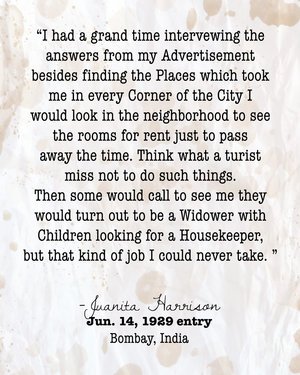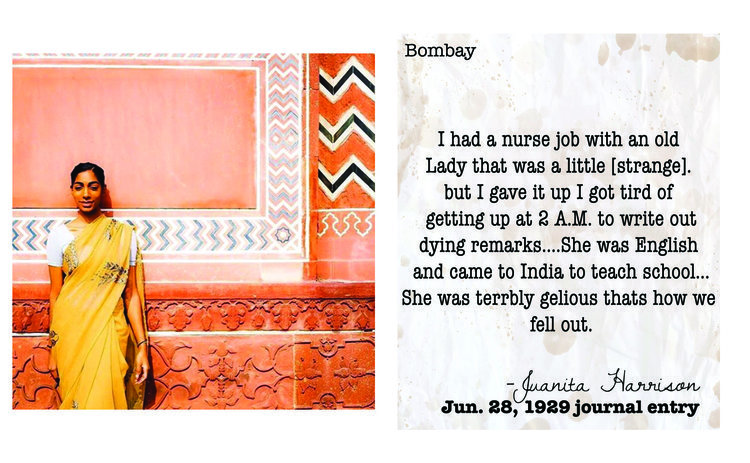Juanita Harrison, 1
Graduating from grad school (Parsons MS, baby!), reentering into the “real world,” venturing off to make great things happen, and hearing encouragement like “The world is your oyster!” and “There are no limits to what you can do!”…all of this reminds me of travel: the intentional change in state go being to discover new places and see ones self against a new setting. It reminds me of how I coined the name “Vagabroad”: with the idea that everything we go through in life is like an actual place: we’re visiting, passing through, dwelling or settling for a bit—wither way we’re always traveling.
With this in mind, we return to the “Where are OUR journals?” series. At this moment in my life and at this time in history when more women of color than ever have access to not only travel but also to share their travel tales not only in journals but also across platforms (Travel Noire, Nomadness Tribe, The Maati Mag, Soul Society, Black Girls Travel Too, Can't Stay Put, Catch Me If You Can, Chronicles of a Travel Addict, Shivya etc.), it only makes perfect sense to share Juanita Harrison's travel journal. In order to write history we must know what's come before us and I'll be honest, having traveled 15 countries myself, I had NO idea that there was such a lofty queen of international freelancing and border-crossing like I found in Juanita Harrison. I wonder if she was aware of her matriarchal relationship to world travelers and experiential storytellers of color who would create space and imagery and experiences that pay homage to her unevenly quilted international itinerary...?
Founder of Travel Noire, Zim Ugochukwu saunters through Cinqe Terre...
“you don’t even know the spaces your narrative could create for you. you could be writing the key to the door being created as you continue. you have no idea the opportunities that could come your way to change your life in an instant all because you persevered in your journey”
Not much biographical information is known about Ms. Harrison's beyond her journal, except that she was light brown, petite woman with an elementary education and a couple of languages under her belt via work taken in Cuba at age 16, classes at the YWCA, and some French lessons taken a few months into her travels abroad. Based on her introductory journal entries we learn that Juanita always dreamed of seeing the world--of traveling it for an extended period of time even into many years--and that all of her work in the US before her departure was to save up for this grand voyage.
Sissi Johnson in Almaty, Kazakhstan
At age 36,from June 1927-April 1935, Juanita Harrison was finally able to make this happen, embarking on a world tour which she documented in her journal-turned-book My Great Wide Beautiful World.
Juanita funded her voyages by “freelancing” around the globe (WHAT.), placing ads in local papers and booking jobs with various households from Paris to London, Egypt to Japan and saving up for trains, buses, YMCA/ hotel lodging, and ship voyages going wherever she felt like going to next.
Can we talk about this? Juanita Harrison's ability to come and go as she pleased in the late 1920s-30s is astounding. While her contemporaries were relegated to invisibility in domestic roles in white households, Juanita Harrison was exercising the agency of a cosmopolitan nomad abroad by crafting life as on her own terms.
Presciently, this teastained woman took control over her space, her body, her dreams, and her geographical boundaries by doing what few Black women of that time had the opportunity-or the mindset- to do: see the world as a free Black woman belonging to no one except herself. I NEVER knew there was such a woman in our history.
“can we be bold enough to become the vision of that thing which we’ve never seen?”
Juanita relished this for every ounce it was worth and then some. If she did not want to be in a place she would buy a ticket and go somewhere else. Her loyalty to a space was a train or bus or boat ticket away from being swayed in whichever direction each took her. Taken as a metaphor how many of us exercise this more than fundamental human right? Juanita's unapologetic no-strings-attached way of travel is a model to be replicated in our travels and in our journeys.
Teastained traveler Brienne Yvonne in Agra, India.
So much insight can be abstracted from how this woman chose to live her life. She treated herself like a being of purpose without waiting for sociocultural hints of confirmation to step out on that fact. Dreaming beyond herself, Juanita prophetically worked hard for and with her dreams, invested in them whenever possible. Without hesitation she took the leap into a lifestyle that had no precedent for a woman that looked like her or came from her status. She didn't allow being the first or being unusual in her aspirations to keep her from preparing or endeavoring. She traveled ALONE and didn't hunger for "friends" to attach to her journeys and keep her any company (can we learn something from that?). On her travels Juanita made lifestyle decisions that pushed her deeper into cosmopolitanism and further from being inferred as an uneducated rover.
Juanita made time to READ, to spend time with the locals, she tried to blend in whenever she could and distance herself from being seen as "American" ( I try my best to do the same when I travel abroad!), and she maintained an inquisitive disposition whenever around those native to the country she was visiting. Language difference didn't deter her. Cultural garb didn't scare her.
Additionally, Juanita never equated her job with her identity–a mindset which enabled her to be the monument which she stands as being for us today. It was empowering to read of the thoughts of her next adventures and how she'd achieve them during each of her international “hustles,"her “freelance gigs”.
The societal climate in the States at that time in history did not allow Black maids, aka “the help” to have a decimal amount of as much flexibility/ freedom. Black women could not choose employers, leaving whenever they felt like doing something new. However, in Europe Juanita was able to decide who she worked for, why, and how long she’d stay as she traveled. Even if employers expressed a need for her she'd contemplate their offer and book a ticket to try her luck elsewhere. This enabled her to remain not only financially but also mentally independent and navigate without the encumbant duties of “being employed”--a reality she'd never live in America. She paved the way for a new approach towards living...I hope we discover and seek to replicate it as we Journey Soulfully.
Monique Gray and friend in Cairo Egypt.
Now I won't lie, I've often struggled with the concept of a "real job" making me look like less than I am. Being a barista, janitor, waitress, etc. are not glamorous, nor do they leave room for bragging rights amongst friends--however to own ones self and have the courage to allow "menial" work to fund your ventures? That takes vertebrae that I've noted well in Juanita Harrison. Housekeeping was merely a vehicle for her to do whatever she pleased across the globe. Juanita kept the big picture to her work always at the forefront of whatever job she took and whoever her employer was. She still kept her self-esteem and pride; not lacking in any confidence to leave semi-abusive work situations or condescending, low-paying employers. Her choice of work never trespassed the dignity she held for herself and the woman she was well-aware she was becoming with every stamp on her passport, every border crossed.
Had I known about Juanita Harrison in my schooling years my mindset towards work and travel and owning my geographical coordinates along the way would have been utterly different. This woman was breaking rules before rules had been made about working and traveling, "bleisure", and cultural exchange while being a person of color. She set a bar almost 100 years before the world was ready to build the ladder. Had I known there was a woman who looked like me who, in the 1920s and 30s made her own rules to live the life she dreamed I would have thought far differently about my life path YEARS ago.
This is the power of this sort of history; the power of writing our history in the form of our thoughts and feelings in journals. It's why "Where are OUR Journals" has been created: we need to know the other side of the story we're presented about ourselves through lecture, article and textbook (no matter how academic).
Teastained traveler Modupe S. in Giza, Egypt.
You don’t even know the spaces your narrative could create for you. You could be writing the key to the door being created as you continue. You have no idea the opportunities that could come your way to change your life in an instant all because you persevered in your journey.
From writing a book to speaking in front of hundreds, to getting your dream job or having the chance to create it–I promise that one day your narrative will lead to you being in the place it has qualified you (and no other) to occupy because you endured–and told–your own story.
I hope Juanita Harrison's travel journal inspired you to dream beyond yourself and Journey Soulfully. Her life is awe-inspiring for we teastained women not only because it happened but because she WROTE IT without any awareness that her book could become a tome of insights for those looking to make decisions that contradict their "status", life circumstances, or availability to opportunities.
Do you travel? How often? And do you journal when you travel? What do you write about? You might be a Juanita Harrison for the next generation...Every place you go and everything you experience is a morsel of encouragement for those coming after you.
Own yourself.
Journey Soulfully












